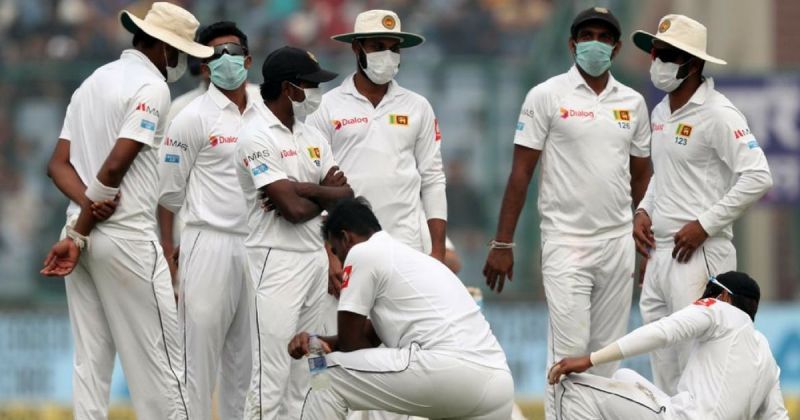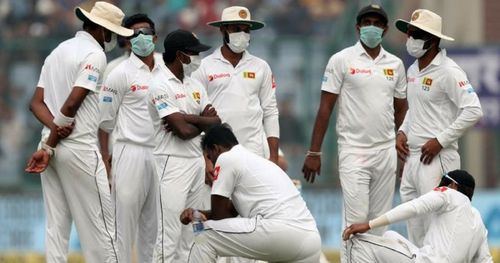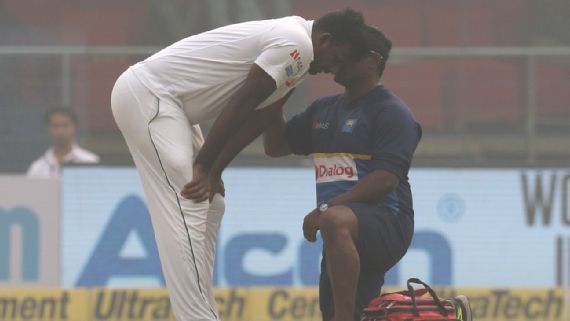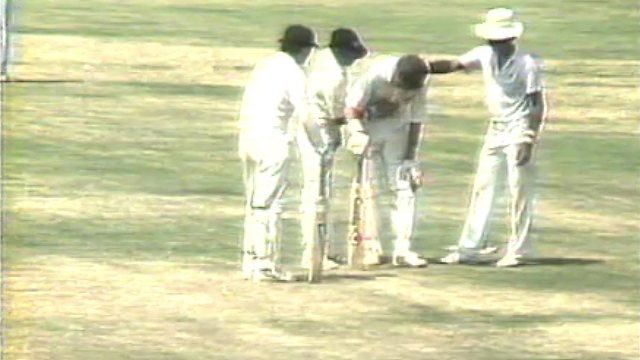
India vs Sri Lanka 2017: The needless farce of smoke-gate in Delhi

Virat Kohli could not have chosen a better day to register his career-best Test score. I use the word 'chosen' because that's the kind of liberty he has taken while dealing with a Sri Lankan attack that could arguably be termed as their weakest in several years. The reason why I say this would be clear if we read a comment made by India fielding coach Bharat Arun during the post-match press conference on day two of the second Test. He pointed to Kohli's ease at the crease and drew comparisons with the Sri Lankans who spent most of the time after lunch complaining about the pollution levels in Delhi.
"Virat (Kohli, the Indian captain) batted close to two days, he didn’t need a mask. We have focused on what we need to do and achieve for the team. Our job is to go and play. So, we are focusing on that.," Arun said.
Arun was quick to convey that perhaps Sri Lanka's focus was more on pollution levels than cricket and said that such a thing was absent on India's agenda. The agenda was to win. He had to give this explanation because for approximately 40 minutes immediately after the lunch interval there were scenes erstwhile unheard of and unseen on any cricket field.
Sri Lanka's two frontline pacers - Lahiru Gamage and Suranga Lakmal - had to walk off the ground owing to their inability to cope with the poor quality of air in Delhi, especially around the Feroz Shah Kotla. Opening batsman Sadeera Samarawickrama had suffered a concussion after being hit on the head while fielding on day one and was in the dressing room, while at least six Sri Lankan players who took the field post lunch on day two wore masks (protective gears) presumably to protect themselves from breathing the Delhi air, which has been deemed hazardous for health.
Shortly after a 17-minute delay, caused by the Sri Lanka physio who was attending to Gamage, when Lakmal walked off the park - the second interruption made longer by head coaches from both sides, Ravi Shastri and Nic Pothas, who walked out to the field to have a chat with the umpires, and prolonged team huddles by Sri Lanka led by their captain Dinesh Chandimal - it was realized that Sri Lanka were left with only 10 men on the field.
Such was the condition that none of the players on the bench were fit enough to take the field for the visitors and Sri Lanka trainer Nick Lee and fielding coach Manoj Abeywickrama were prepared to field as substitutes.
"The conditions are the same for both teams, we aren’t too bothered about it. The umpires and the match referee, they have a job on hand and it’s not up to the players to go and protest. They know what they are doing. When the play was unnecessarily being stopped, we just wanted to get on with the game because our focus is to win this Test match," Arun added.
These frequent interruptions could have prompted Kohli to declare the innings abruptly as he gesticulated from the dressing room that India were ready to bowl in these conditions and that the game must go on. The breaks had already accounted for his wicket earlier in the session, as Arun later admitted, and at that moment in the match, a declaration seemed to be the only plausible solution to the stalemate.
Russel Arnold, who was on-air at the time, praised Kohli's move while his partner in the commentary box, Harsha Bhogle, called it as 'putting an end to this farce.' Jonathan Trott, also a part of the commentary team, later termed the move to wear masks as 'ridiculous.'

Was Kohli's declaration the only solution to the deadlock? Certainly not. Rather, it was a reaction to the extended period of no-show that could have been easily avoided. That Sri Lanka did not have a player who could field is as big a remark on their bench strength as it is on the pollution levels in the city.
The prolonged team meetings on the field and incessant marches to and fro the dressing rooms weren't just contrary to the spirit of the game but also left a bad impression on the thousands who had turned out at the Kotla as well as those watching at home across the world.
Arun had a point to make, which was resonated by VVS Laxman in the post-match analysis. The point was that if the umpires and the match referee deemed the conditions fit for play - knowing very well the state of the Air Quality Index (AQI), I assume - there was no need for unnecessary delays. Not the least was there a need for support staff to walk out and talk to the umpires, not players. Was that not an overreach on their part? Could they have not done with voicing their concerns to the match referee?
If at all there was an error in judgment, it was on the BCCI's part - and by extension the SLC - for giving their consent to hosting a game of cricket in Delhi at this time of the year. After the boards had mutually agreed, it made little sense to cause an interruption questioning the playing conditions.
Sure, Gamage and Lakmal had severe issues, as did many others, but so did Neil McKenzie on South Africa's 2007-08 tour of India. He lost approximately three and a half kilograms during his innings in Chennai. I did not find his captain, Graeme Smith, calling his players in a huddle and then complain to the umpires about too much heat.
Nor did the Australians complain about the hot and humid conditions in Chennai and Kolkata during the ODI series earlier this year. I don't see India or teams from the subcontinent complain about conditions in England being too cold to play cricket during the early days of the summer.
And before we draw the line and demarcate poor air quality as a greater risk to the players' safety and health than extreme heat or biting cold, I would like to remind that health risks could be different for different players in different parts of the world depending on how they are conditioned.
While players are completely justified in their stand to report an illness to the team, the team is not justified to hold up play because they feel - not the umpire or the referee - that the conditions are unsafe, no matter what the parameters measuring the said condition indicate.

Sri Lanka interim coach Nic Pothas defended his players' decision to protest. "Obviously, it is well documented that Delhi has high levels of pollution. They had got extremely high at one point, we had players coming in at one point and vomiting. There were oxygen cylinders in the dressing room. It is not normal for players to suffer in that way while playing the game. From our point of view, it has to be stated that it is a very, very unique case," he said.
"I thought all the officials, the match referee (David Boon) and the others handled the situation very well. When it is a new situation for everybody, it is not easy to make decisions. I feel for the umpires and I feel for the match Referee. But the job of myself and the manager is to make sure that the players are safe. That’s all that we do," Pothas added.
And he did that - made sure the players are safe - presumably to the best of his ability while catering to those who had vomited in the dressing room and were facing health issues. It was when he - or Shastri for that matter - strolled out to the field to have a chat with the umpires that he caused an overreach, which was contrary to the spirit of the game.
It is a no-brainer to realize that the air quality in Delhi has been poor for several years and had reached drastic levels last month. It is also known that two Ranji Trophy games last season had to be abandoned without a ball being bowled because of low visibility across the ground caused by dense smog. But the point to be noted here is that the match officials had taken the call to not put the players on the field, which was not the case with this Test.
Another argument defending Sri Lanka's stand was the relative difference between the AQI values in Delhi and Colombo and other parts of Sri Lanka. Sri Lanka is a country known for its cleanliness, and the average AQI levels hovered around 60 on Sunday. On day two it was well in excess of 200. The conclusion to be drawn from this data is that the atmosphere in Delhi was alien to the Sri Lankans and they had every right to complain, and by extension, hold play.
If that forms a solid ground for an argument, then Dean Jones, during that marathon knock of 210 in the Chennai Test of 1986 - wherein he vomited on the ground - should have taken ill and Allan Border, his captain, should have complained to the umpire about 'unsafe' playing conditions. Had that happened, the second-ever tied Test, also the last till date, would not have reached the conclusion it did and Jones wouldn't have told us, "I can't remember a thing after 120 in that innings," because in all likelihood, the game would not have carried on.
More astonishingly, Sri Lankan batsmen weren't seen wearing masks when they came out to bat only minutes after almost all of them had their faces covered when India were batting. On the third day, the AQI value was even higher - 251 as compared to 225 on Sunday - and yet no Sri Lankan batsman was seen wearing masks.
The reasoning that fast bowling and fielding are more strenuous than batting can be easily debuffed by stating the plain fact that all of these are aerobic activities and players could be easily affected at any time.
Hence, while Sri Lanka's move to wear masks should not be questioned - they're free to care about their personal health - the timing of the on-field protest and the absence of masks while batting should certainly be put under scrutiny. To digest the timing of their protest when India were cruising to a score in excess of 550, especially after having frustrated the Indian captain in some capacity, as a mere coincidence is hard, at least for me.
What options did Sri Lanka have then? One was walking off the field as a unit, in which case there could have been the risk of forfeiting the game and losing the series. Well, that's what several captains have done in the past, although for different reasons. Pakistan, led by Inzamam-ul-Haq, did something similar at the Oval during their tour of England in 2006. Pakistan had to forfeit that game, and England were awarded victory. That would have been as disappointing as their demeanour on the field eventually was.
Sri Lanka had to get on with the game and play with their coaches and trainers on the field if the players weren't fit. When they put up enough resistance to convey that they wouldn't, the Indian captain took the mantle upon himself.
Protests and complaints are allowed, of course, but within the realms of what is permissible. The cause behind Sri Lanka actions on the field on day two was genuine. There's no denying that. But the manner in which they went about their business was a poor example of sportsmanship and also invited criticism targeted at their integrity.
Perhaps the boards would avoid hosting any game of competitive cricket in Delhi during this time of the year in the near future, but what happened in Delhi would certainly not be forgotten - for different reasons, of course.